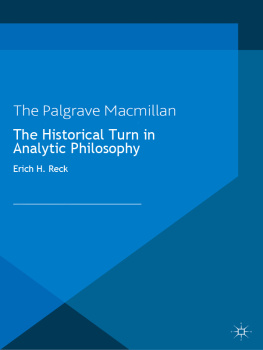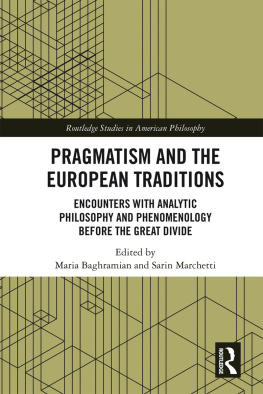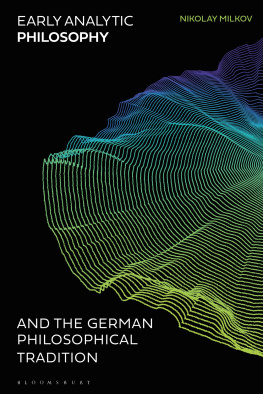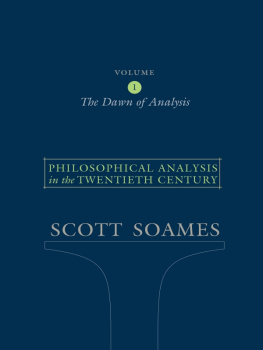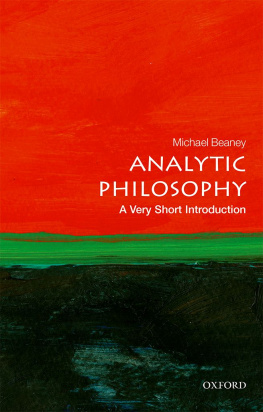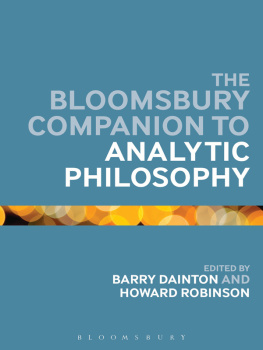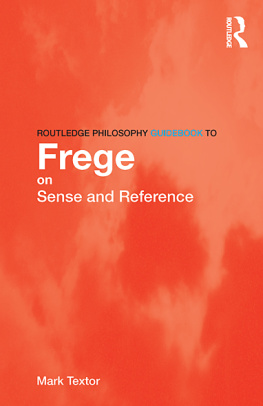Analytic Philosophy
Analytic Philosophy: An Interpretive History explores the ways interpretations (of key figures, factions, texts, etc.) shaped the analytic tradition, from Frege to Dummet. It offers readers 17 chapters written especially for this volume by an international cast of leading scholars. Some chapters are devoted to large, thematic issues like the relationship between analytic philosophy and other philosophical traditions such as British Idealism and phenomenology, while other chapters are tied to more fine-grained topics or to individual philosophers, like Moore and Russell on philosophical method or the history of interpretations of Wittgensteins Tractatus. Throughout, the focus is on interpretations that are crucial to the origin, development, and persistence of the analytic tradition. The result is a more fully formed and philosophically satisfying portrait of analytic philosophy.
Aaron Preston is Associate Professor and Chair of the Philosophy Department at Valparaiso University. He is the author of Analytic Philosophy: The History of an Illusion (2007) and a number of articles on the history and historiography of analytic philosophy and on the philosophy of religion.
First published 2017
by Routledge
711 Third Avenue, New York, NY 10017
and by Routledge
2 Park Square, Milton Park, Abingdon, Oxon OX14 4RN
Routledge is an imprint of the Taylor & Francis Group, an informa business
2017 Taylor & Francis
The right of Aaron Preston to be identified as the author of the editorial material, and of the authors for their individual chapters, has been asserted in accordance with sections 77 and 78 of the Copyright, Designs and Patents Act 1988.
All rights reserved. No part of this book may be reprinted or reproduced or utilised in any form or by any electronic, mechanical, or other means, now known or hereafter invented, including photocopying and recording, or in any information storage or retrieval system, without permission in writing from the publishers.
Trademark notice: Product or corporate names may be trademarks or registered trademarks, and are used only for identification and explanation without intent to infringe.
British Library Cataloguing in Publication Data
A catalogue record for this book is available from the British Library
Library of Congress Cataloging in Publication Data
Names: Preston, Aaron, editor.
Title: Analytic philosophy : an interpretive history / Aaron Preston.
Description: New York : Routledge, 2017.
Identifiers: LCCN 2016035780 | ISBN 9781138800786 (hardback) | ISBN 9781138800793 (pbk.)
Subjects: LCSH: Analysis (Philosophy)--History.
Classification: LCC B808.5 .A523 2017 | DDC 146/.409--dc23
LC record available at https://lccn.loc.gov/2016035780
ISBN: 978-1-138-95142-6 (hbk)
ISBN: 978-1-138-95144-0 (pbk)
ISBN: 978-1-315-66824-6 (ebk)
For Monica Madan,
whose skill in interpreting life has brought me great joy, and from whom I am continually learning.
Aaron Preston
This collection aims to examine the role of interpretation in shaping analytic philosophy, understood here as a philosophical tradition (more on which shortly). Central to this project is the notion of a tradition-shaping interpretation. By tradition-shaping interpretation I mean (roughly) an interpretation that was or is crucial to the origin, development, or persistence of a tradition. Some tradition-shaping interpretations interact with the relevant tradition at a relatively fine-grained level, pertaining directly to the canonical figures, factions, views, and texts that comprise it. For example, the logical positivists interpretation of Wittgensteins Tractatus facilitated grouping Wittgenstein and the positivists together as analytic philosophers in a way that would not otherwise have been possible. Thus it indirectly shaped the analytic tradition as a whole: both Wittgenstein and the logical positivists are core, canonical members of the tradition in part because of this early interpretation of Wittgenstein (which most would now regard as a misinterpretation).
Other tradition-shaping interpretations occur at a more coarse-grained level, pertaining directly to the tradition as a whole. For instance, it was once widely believed that analytic philosophy was defined by a commitment to linguistic analysis as the uniquely correct philosophical method and that there were clear boundaries between analytic philosophy, pragmatism, and so-called Continental philosophy. But things have changed. No one thinks that contemporary analytic philosophy is committed to linguistic analysis, and historians of analytic philosophy question whether this was a defining commitment of the tradition at any stage of its development. Meanwhile, new interpretations of Quine portray him as a pragmatist as much as an analyst (cf. Godfrey-Smith 2014), thus blurring the lines between the two traditions and causing us to wonder whether they were ever that clear to begin with (on this latter point, see Cheryl Misaks chapter in the present volume). Likewise, some have claimed to see similarities between the later Wittgenstein and some prominent themes in Continental thought (cf. Staten 1984, Garver and Lee 1994). Interpretations of Wittgenstein along these and similar lines blur the boundaries between those traditions and have raised questions concerning Wittgensteins status as an analytic philosopher (cf. Glock 2004).
Given these quick examples, it should be obvious that what we nowadays call the analytic tradition can to a great extent be characterized as the result of the interplay of changing interpretations at different levels of granularityat the level of individual philosophers and their works on the one hand and, on the other, at various levels of aggregation, from sub-groups within the tradition (such as logical positivism or Oxford philosophy) to the tradition as a whole. This may seem a surprising proposal, not least because characterizing analytic philosophy in this way has a distinctively Continental/hermeneutical air to it. Be that as it may, reflection on the nature of intellectual traditions shows that there is nothing unusual about interpretation playing a formative role. To my knowledge, the most influential understanding of tradition in contemporary Anglo-American philosophy (and, for a long time, perhaps the only reflectively developed understanding available in the philosophical literaturecf. Glock 2008, 220) comes to us from Alasdair MacIntyre. According to MacIntyre, a tradition is an historically extended, socially embodied argument, and an argument precisely in part about the goods which constitute the tradition (MacIntyre 1984, 222) or, more specifically:
An argument extended through time in which certain fundamental agreements are defined and redefined in terms of two kinds of conflict: those with critics and enemies external to the tradition and those internal, interpretive debates through which the meaning and rationale of the fundamental agreements come to be expressed and by whose progress a tradition is constituted.
(MacIntyre 1988, 12, my emphasis)
While MacIntyre did not propose these as descriptions of specifically philosophical traditions, they apply to such traditions as well. Specifically, MacIntyres insight that traditions characteristically progress via internal, interpretive debates concerning how best to understand their fundamental agreements fits well with Moritz Schlicks observation that


